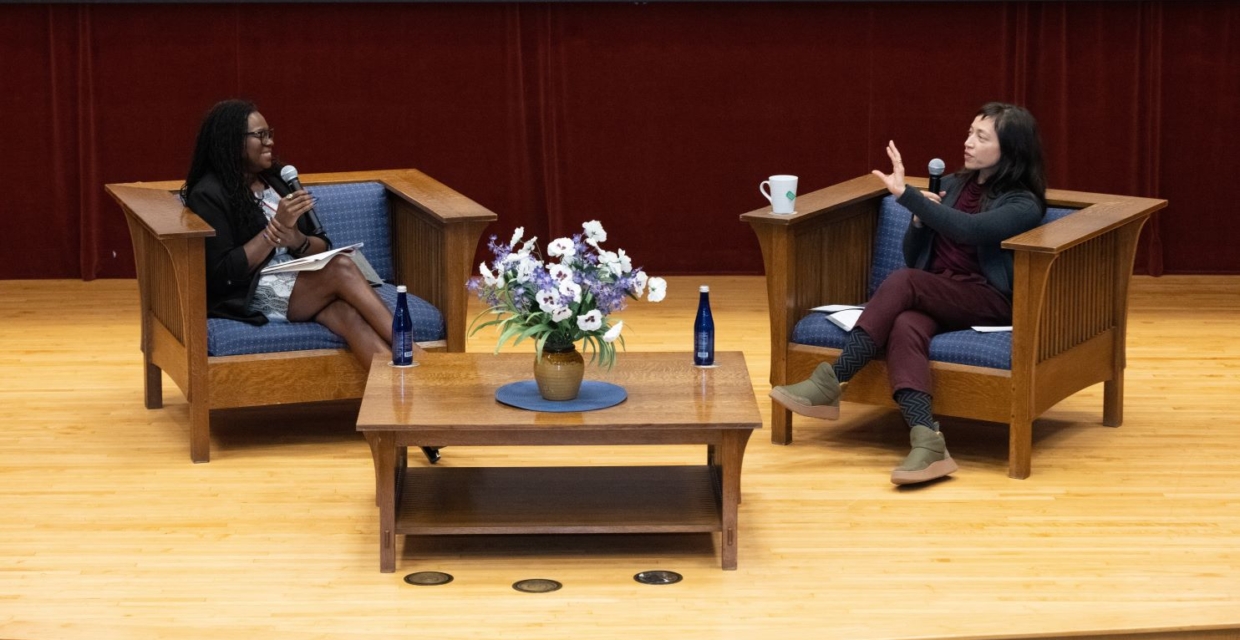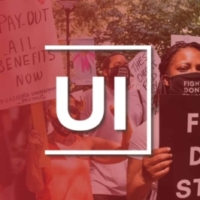
Introduction
Step into the world of our President and CEO, Rebecca Dixon, the driving force behind NELP’s mission for a transformative Good-Jobs Economy. In our exclusive one-on-one conversation, Rebecca shares her journey from the heart of Mississippi to the forefront of advocacy, shedding light on the experiences that shaped her unwavering commitment to fairness and equity in the labor market. Our conversation illuminates her thought leadership and how she inspires our staff and various partners and stakeholders to implement the Good-Jobs Economy vision so one job is enough for anyone who wants and is able to work.
MNR: Rebecca, could you share with me what life experiences have helped shape you and who you are as an advocate?
RD: As the descendant of enslaved people and daughter of sharecroppers and domestic workers, my family’s experiences shaped my understanding of the systemic inequalities that persist in our society, particularly for Black workers and families. Growing up my father’s employment history ranged from tending to cows on a dairy farm to county road maintenance, supplemented by various odd jobs.
Despite working endless hours, economic stability eluded him, and this injustice struck me profoundly. And it hit me even harder later on when he passed away when I was just a kid. Our family had to rely on tiny survivor’s benefits, which felt like a slap in the face because all those years he spent on the dairy farm didn’t even count towards social security.
These early life experiences have driven me to work towards creating a more equitable labor market where everyone’s labor is valued and protected.
Coming from a place deeply entrenched in civil rights struggles, I was exposed to the importance of civic engagement from a young age. Despite the challenges and history of oppression, I hold onto a sense of possibility and believe in the power of collective action to drive systemic change. Reflecting on my upbringing fuels the commitment I have to advocacy at NELP, where we work to shape laws and policies that will build a good-jobs economy, ensuring that everyone can access dignified employment opportunities.
MNR: That’s powerful. What about your early experiences in the workforce, Rebecca? How do you think those experiences influenced the way you think about systems change for working people, and NELP’s impact and mission?
RD: The first summer after college, I went home and I did not have a job lined up. So I went to the WIN job center and they said we have Walmart for $4.25 an hour and a chicken processing plant for $7.25 an hour. I chose the $7.25 job thinking, “I can do anything for three months.”
I didn’t last very long. It was freezing cold. It smelled like bleach and the chickens were going by so fast. I was cutting them and messing them up. I was not good at it. The knives were super sharp. I was terrified I was going to cut myself.
I don’t usually give up, but I gave up on that and promptly started working at Walmart. It was my first experience with wage theft.
I was on the night shift and they told us we were going to get a shift differential. So we would get $4.75 or $4.50 instead of $4.25. They never gave it to us. I kept nagging them and they never did do it.
Those experiences really taught me that we have to actually change what people experience on the job. If Walmart was a union shop, it would have been a different experience. If workers had more options, it would be harder for employers to treat them poorly.
Those experiences also influenced how I think about working people and how I think about what their challenges are, and why I feel really passionate about NELP making an impact. It’s real and live for me.
MNR: What’s your top priority for NELP’s work?
RD: I led the adoption of a “Good-Jobs Economy” framework across all of our program areas a couple of years ago to guide us as we work towards economic security, economic justice, and economic mobility. My priority is to advance this framework in ways that will uplift our entire movement to improve the lives of working people. People need good jobs – it doesn’t matter who you are or what kind of work you do.
Black women have been going to college and earning degrees in larger numbers for the more than 40 years, but they’re in jobs that are the lowest-paid. That means educational opportunities alone are not the solution.
We have to bring our vision forward and say what we are trying to accomplish given the universe of the problem. We have to get really specific.
For instance, consider Mississippi, where the maximum unemployment insurance benefit is a mere $235 per week. It’s evident that such an amount falls far short of covering basic living expenses like rent. By advocating for an increase in this benefit to a minimum level and ensuring guaranteed indexing to wage growth in the state, we can prevent its value from eroding over time. By focusing on solutions grounded in racial equity, we can develop approaches that uplift all individuals and leave no one behind.
MNR: I love your example of grounding in racial equity in ways that will benefit everyone. Could you explain the concept of occupational segregation and its impact on marginalized groups in the workforce?
RD: Occupational segregation refers to the disproportionate representation of certain demographic groups in specific types of jobs, often resulting in lower wages and limited opportunities for advancement. This perpetuates economic disparities, particularly for women and people of color, who are overrepresented in low-paying and precarious positions.
Addressing occupational segregation requires intentional efforts to create pathways to higher-paying and more equitable employment opportunities for marginalized groups. This is something we’ve taken on for a long time, and this year we will be spending more time with partners and allies refining our solutions to decades of persistent occupational segregation.
MNR: What one or two changes for workers would you like to see NELP driving over the next five to seven years?
RD: I think part of what I’m getting at with occupational segregation and occupational integration is around economic mobility. So a lot of the work we do is about raising the floor and that is important and critical. That’s the fastest way to help people because often economic mobility is a generational issue to reform.
There is a role for us as the National Employment Law Project to target employment discrimination and take it out of the equation. It’s true discrimination is not as blatant as it once was, but it is insidious and persistent. We can make movement on it while we raise the floor for all workers.
And I would also love it if we could build towards every worker being robustly covered by unemployment insurance. My background as an unemployment insurance expert taught me how critical it is to a good-jobs economy—and how important it is to keeping children and families out of poverty.
MNR: In taking on these big challenges, what makes you optimistic?
RD: Consistently, the U.S. has operated within a labor market framework where opportunities are distributed based on factors such as region, race, gender, and other characteristics. This ingrained system poses a significant challenge for our movement. How can we break through?
I’m optimistic. Despite the ongoing public discourse surrounding the racial wealth gap, there’s a distinct lack of concrete commitments from federal, state, or local governments to address it within a defined timeframe. However, securing a high-level commitment from governments could bring about transformative change. Imagine if the government committed to narrowing the racial wage gap between Black women and white men by 40% by 2030. Such a goal would provide a tangible metric for progress.
After all, we can only manage what we measure.
Presently, I’m actively developing a project we’re calling the Labor Market Equity Index. This initiative will track progress over time and set forth clear expectations for leaders to actively work towards closing these disparities. Additionally, it will foster the creation of accountable plans that we can directly influence and monitor, driving positive change in the labor market.
MNR: What do you envision as we get closer to 2030 and beyond?
RD: As we approach 2030, my vision is anchored in the pursuit of a racially and economically just society. Central to this vision is the establishment of a good-jobs economy, where the dignity and rights of workers are paramount. Achieving this requires a concerted effort to dismantle occupational segregation, raise the floor for workers, and bolster organizing and campaigns that build worker power, whether through unions, worker centers, coops, or other creative ways.
I envision that our movement will remain committed to fair wages, benefits, and working conditions for everyone.
Witnessing the victories of organized labor brings me immense joy and reinforces the transformative power of collective action in shaping a brighter future. Beyond 2030, my vision encompasses a society where every person can thrive and fulfill their potential, free from discrimination and injustice.




